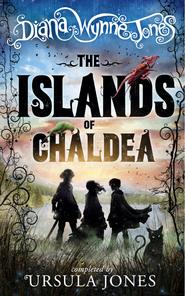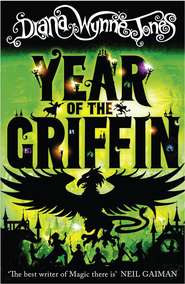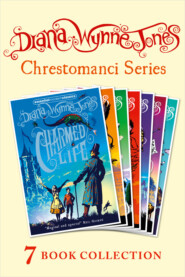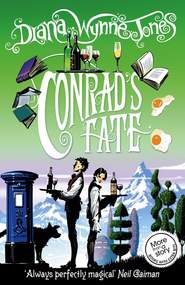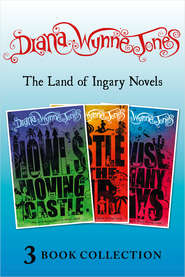По всем вопросам обращайтесь на: info@litportal.ru
(©) 2003-2024.
✖
Castle in the Air
Настройки чтения
Размер шрифта
Высота строк
Поля
“Now where is that box?” said Fatima.
“Find it, find it!” said Assif. “It is the very words of the fortune teller his poor father brought to the bedside of his second wife an hour after Abdullah’s birth. He must see it!”
“Written in your own father’s hand,” Hakim said to Abdullah. “The greatest treasure for you.”
“Here it is!” said Fatima, triumphantly pulling a carved wooden box off a high shelf. She gave the box to Assif, who thrust it into Abdullah’s hands.
“Open it, open it!” they all three cried excitedly.
Abdullah put the box down on the purple cashier’s table and sprung the catch. The lid went back, bringing a musty smell from inside, which was perfectly plain and empty apart from a folded yellowish paper.
“Get it out! Read it!” said Fatima, in even greater excitement.
Abdullah could not see what the fuss was about, but he unfolded the paper. It had a few lines of writing on it, brown and faded, and definitely his father’s. He turned towards the hanging lamp with it. Now that Hakim had shut the main doors, the general purpleness of the emporium made it hard to see in there.
“He can barely see!” said Fatima.
Assif said, “No wonder. There’s no light in here. Bring him into the room at the back. The overhead shutters are open there.”
He and Hakim took hold of Abdullah’s shoulders and pushed and hustled him towards the back of the shop. Abdullah was so busy trying to read the pale and scribbly writing of his father that he let them push him until he was positioned under the big overhead louvres in the living room behind the emporium. That was better. Now he knew why his father had been so disappointed in him. The writing said:
These are the words of the wise fortune teller. “This son of yours will not follow you in your trade. Two years after your death, while he is still a very young man, he will be raised above all others in this land. As Fate decrees it, so I have spoken.”
My son’s fortune is a great disappointment to me. Let Fate send me other sons to follow in my trade, or I have wasted forty gold pieces on this prophecy.
“As you see, a great future awaits you, dear boy,” said Assif.
Somebody giggled.
Abdullah looked up from the paper, a little bemused. There seemed to be a lot of scent in the air.
The giggle came again, two of it, from in front of him.
Abdullah’s eyes snapped forward. He felt them bulge. Two extremely fat young women stood in front of him. They met his bulging eyes and giggled again, coyly. Both were dressed to kill in shiny satin and ballooning gauze – pink on the right, yellow on the left one – and hung with more necklaces and bracelets than seemed probable. In addition, the pink one, who was fattest, had a pearl dangling on her forehead, just below her carefully frizzed hair. The yellow one, who was only just not fattest, wore a sort of amber tiara and had even frizzier hair. Both wore a very large amount of make-up, which was, in both cases, a severe error.
As soon as they were sure Abdullah’s attention was on them – and it was: he was riveted with horror – each girl drew a veil from behind her ample shoulders – a pink veil on the left and a yellow on the right – and draped it chastely across her head and face. “Greetings, dear husband!” they chorused from beneath the veils.
“What!” exclaimed Abdullah.
“We veil ourselves,” said the pink one.
“Because you should not look at our faces,” said the yellow one.
“Until we are married,” finished the pink.
“There must be some mistake!” said Abdullah.
“Not in the least,” said Fatima. “These are my niece’s two nieces who are here to marry you. Didn’t you hear me say I was going to look out for a couple of wives for you?”
The two nieces giggled again. “He’s ever so handsome,” said the yellow one.
After a fairly long pause, in which he swallowed hard and did his best to control his feelings, Abdullah said politely, “Tell me, oh relatives of my father’s first wife, have you known of the prophecy which was made at my birth for a long time?”
“Ages,” said Hakim. “Do you take us for fools?”
“Your dear father showed it to us,” said Fatima, “at the time he made his will.”
“And naturally we are not prepared to let your great good fortune take you away from the family,” Assif explained. “We waited only for the moment when you ceased to follow your good father’s trade – this surely being the signal for the Sultan to make you a Vizir or invite you to command his armies, or maybe to elevate you in some other way. Then we took steps to ensure that we shared in your good fortune. These two brides of yours are closely related to all three of us. You will naturally not neglect us as you rise. So, dear boy, it only remains for me to introduce you to the magistrate who, as you see, stands ready to marry you.”
Abdullah had, up to now, been unable to look away from the billowing figures of the two nieces. Now he raised his eyes and met the cynical look of the Justice of the Bazaar, who was just stepping out from behind a screen with his Register of Marriages in his hands. Abdullah wondered how much he was being paid.
Abdullah bowed politely to the Justice. “I am afraid this is not possible,” he said.
“Ah, I knew he would be unkind and disagreeable!” said Fatima. “Abdullah, think of the disgrace and disappointment to these poor girls, if you refuse them now! After they’ve come all this way, expecting to be married, and got all dressed up! How could you, nephew!”
“Besides, I’ve locked all the doors,” said Hakim. “Don’t think you can get away.”
“I am sorry to hurt the feelings of two such spectacular young ladies—” Abdullah began.
The feelings of the two brides were hurt anyway. Each girl uttered a wail. Each put her veiled face in her hands and sobbed heavily.
“This is awful!” wept the pink one.
“I knew they should have asked him first!” cried the yellow one.
Abdullah discovered that the sight of females crying – particularly such large ones, who wobbled with it everywhere – made him feel terrible. He knew he was an oaf and a beast. He was ashamed. The situation was not the girls’ fault. They had been used by Assif, Fatima and Hakim, just as Abdullah had been. But the chief reason he felt so beastly, and which made him truly ashamed, was that he just wanted them to stop, to shut up and stop wobbling. Otherwise he did not care two hoots for their feelings. If he compared them to Flower-in-the-Night, he knew they revolted him. The idea of marrying them stuck in his craw. He felt sick. But, just because they were whimpering and sniffing and flubbering in front of him, he found himself considering that three wives was perhaps not so many after all. The two of them would make companions for Flower-in-the-Night when they were all far from Zanzib and home. He would have to explain the situation to them and load them on to the magic carpet—
That brought Abdullah back to reason. With a bump. With the sort of bump a magic carpet might make if loaded with two such weighty females – always supposing it could even get off the ground with them on it in the first place. They were so very fat. As for thinking they would make companions for Flower-in-the-Night – phooey! She was intelligent, educated and kind, as well as being beautiful (and thin). These two had yet to show him that they had a brain cell between them. They wanted to be married and their crying was a way of bullying him into it. And they giggled. He had never heard Flower-in-the-Night giggle.
Here Abdullah was somewhat amazed to discover that he, really and truly, did love Flower-in-the-Night just as ardently as he had been telling himself he did – or more, because he now saw he respected her. He knew he would die without her. And if he agreed to marry these two fat nieces, he would be without her. She would call him greedy, like the prince in Ochinstan.
“I am very sorry,” he said, above the loud sobbings. “You should really have consulted me first about this, oh relatives of my father’s first wife, oh much honoured and most honest Justice. It would have saved this misunderstanding. I cannot marry yet. I have made a vow.”
“What vow?” demanded everyone else, the fat brides included, and the Justice added, “Have you registered this vow? To be legal, all vows must be registered with a magistrate.”
This was awkward. Abdullah thought rapidly. “Indeed, it is registered, oh veritable weighing-scale of judgement,” he said. “My father took me to a magistrate to register the vow when he ordered me to make it. I was but a small child at the time. Though I did not understand then, I see now it was because of the prophecy. My father, being a prudent man, did not wish to see his forty gold coins wasted. He made me vow that I would never marry until Fate had placed me above all others in this land. So you see—” Abdullah put his hands in the sleeves of his best suit and bowed regretfully to the two fat brides, “I cannot yet marry you, twin plums of candied sugar, but the time will come.”
Everyone said, “Oh, in that case—!” in various tones of discontent and, to Abdullah’s profound relief, most of them turned away from him.
“I always thought your father was a rather grasping man,” Fatima added.
“Even from beyond the grave,” Assif agreed. “We must wait for this dear boy’s elevation, then.”
The Justice, however, stood his ground. “And which magistrate was it, before whom you made this vow?” he asked.
“I do not know his name,” Abdullah invented, speaking with intense regret. He was sweating rather. “I was a tiny child, and he appeared to me an old man with a long white beard.” That, he thought, would serve as a description of every magistrate there ever was, including the Justice standing before him.
“I shall have to check all records,” the Justice said irritably. He turned to Assif, Hakim and Fatima and – rather coldly – made his formal goodbyes.






